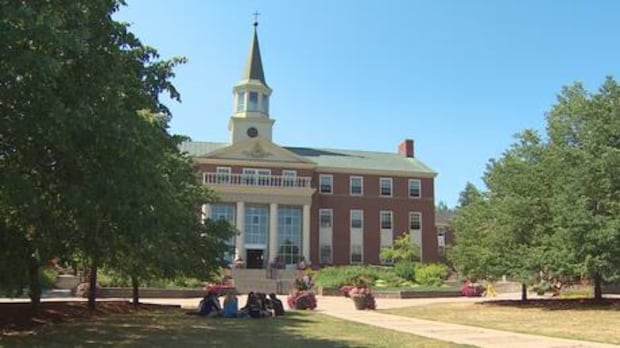New BrunswickNew Brunswick universities saw a 11 per cent drop in international student enrolment in 2025 compared to 2024, and a federal government measure to cap study permit applications is being blamed. Enrolment of students from outside Canada down 11 per cent CBC News · Posted: Oct 19, 2025 5:00 AM EDT | Last Updated: 30 minutes agoSt. Thomas University in Fredericton is among the New Brunswick universities dealing with a declining number of international students. (CBC)New Brunswick universities saw an 11 per cent drop in international student enrolment in 2025 compared with the previous year.For most of the province’s major universities, this is the second year in a row they’ve seen fewer students from abroad.In Fredericton, St. Thomas University spokesperson Jeffrey Carleton said the school is feeling the impact.“It’s a serious concern for every university in the region and every university in the province,” he said.According to a recent report from the Association of Atlantic Universities, the region as a whole saw a 36 per cent decrease in international student enrolment compared to 2024.In a recently released report, the organization attributes the drop to a federal measure aimed at reducing the number of international students studying in Canada. Spokesperson Jeffrey Carleton says St. Thomas University has lost millions of dollars in revenue because of the drop in international students, which for a small university is significant. (CBC)In 2024, Immigration, Refugees, and Citizenship Canada capped the number of study permit applications that could be accepted by universities. The federal government’s stated goals were to ease pressure on Canada’s housing supply, health care and other services, which it said were overwhelmed by population growth.The report used numbers from Mount Allison University, St. Thomas, Université de Moncton and University of New Brunswick for the New Brunswick numbers. Carleton said the changes have done significant damage to the schools’ ability to recruit international students and to the “Canadian education brand.”St. Thomas and the province as a whole were seeing growth in international student numbers over the years before 2024. “And as the federal government brought in their changes, we’ve had two years now of seeing those numbers decline,“ he said.In 2024, all of the province’s major universities, St. Thomas included, saw international enrolment fall, except U de M, which kept the province’s numbers of international students as a whole nearly the same as 2023.Smaller schools hurtThis year, every university saw a decline, with most seeing between 10 and 12 per cent fewer international students than last year. Mount Allison’s numbers dropped by just over six per cent. “So when you look at our previous trends over two years, we’re down by about 30 international students and the lost revenue for that is about $1.4 million,” he said. “For a school the size of St. Thomas, that’s a significant amount of money.”Carleton said the university is not only missing out on revenue for tuition but also for students living in residence. The loss of students ultimately hurts growth that would benefit the university and the province as a whole, he said.Impact on N.B.’s future, Canada’s reputation The association said in a news release that the cap made the visa approval process more complicated for students, increased the amount of funds that students need to bank during their studies, and limited opportunities to work during and after their studies.The organization — and other groups such as the Atlantic Chamber of Commerce and the Atlantic Canada Opportunities Agency — are pushing for a regional strategy to reverse the trend.Peter Halpin, the executive director of the Association of Atlantic Universities, said the loss for the region is devastating, and the federal cap brands Canada as unwelcoming. (CBC)“We’ve had another year of devastating loss of international students right across the region this year in terms of our current enrolment survey,” said Peter Halpin, executive director of the Atlantic association.“We’ve lost nearly 6, 500 more international students this year. That’s in addition to the 3,000 that were lost last year. So that’s a total of 9,500.”New Brunswick’s international student enrolment decrease is lower than the other Atlantic provinces. In the same year, Nova Scotia saw a 37 per cent decrease. Memorial University — the only university in Newfoundland and Labrador — saw a 23 per cent drop and UPEI numbers are down 14 per cent.Halpin said the population in the region is aging, and international students are the best source of “young, energetic” talent needed for growth.The cap also has consequences for Canada’s reputation, he said. “We’re very concerned that Canada’s brand internationally has been badly tarnished by these policy changes and the country is now seen as unwelcoming to international students,” Halpin said.Mount Allison University did not provide an interview but said in a statement the it has seen a “modest decrease” in international student numbers. But the university has taken a “multifaceted approach” to recruitment that has been successful, he statement said. U de M said in a release that its decrease in international student enrolment — by 264 — is partly due to constraints related to obtaining residence permits for international students.Overall New Brunswick saw a one per cent increase in full-time and part-time students.
Most N.B. universities see drop in international enrolment for 2nd year in a row










